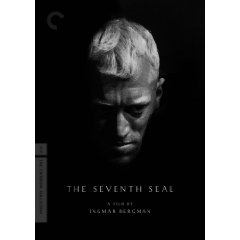
Starring: Anthony Quinn, Giuletta Masina & Richard Basehart
Director: Federico Fellini
La Strada is often considered one of the masterpieces of 20th century filmmaking, a sad and poignant remembrance of innocence lost and of the roads that each of us must choose. As with much of the work of director Fellini, man is viewed as suspended between the heavens and the earth, adroitly symbolized here by Il Matto/The Fool (Basehart), a high-wire circus performer. Fellini's motifs are among the most influential of all post-WWII filmmakers, and you'll find clever Fellini and La Strada references in such unlikely films as Blues Brothers 2000. Giuletta massina's Chaplin-like Gelsomina is among the screen's most poignant and tragic performances, and she, like the entire film, is aided by Nino Rota's evocative score. Fellini had few production values to work with, but here he doesn't need them. La Strada is among the most studied films of late Italian Neo-Realism and a classic of the first rank. (115 mins.)
My Rating: ****


